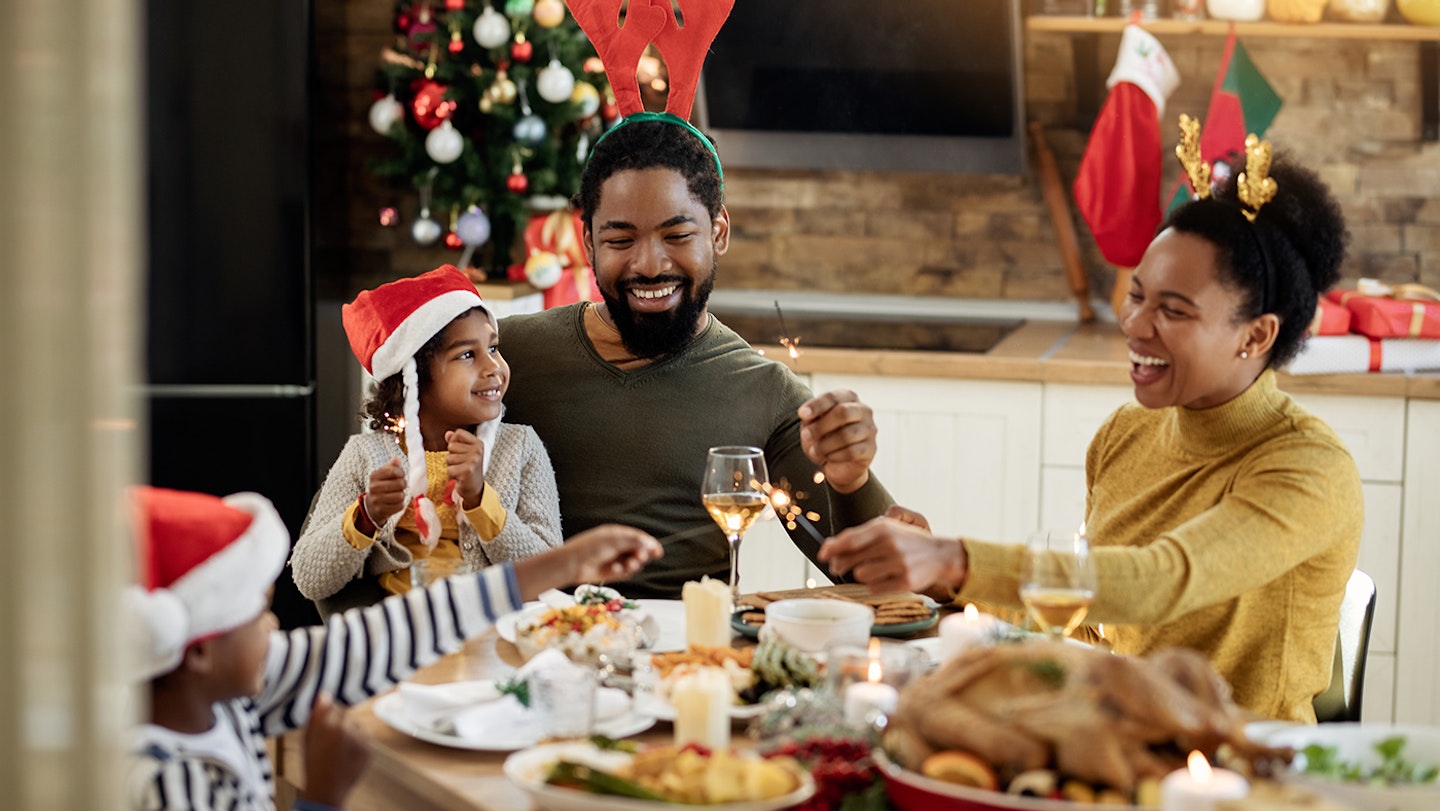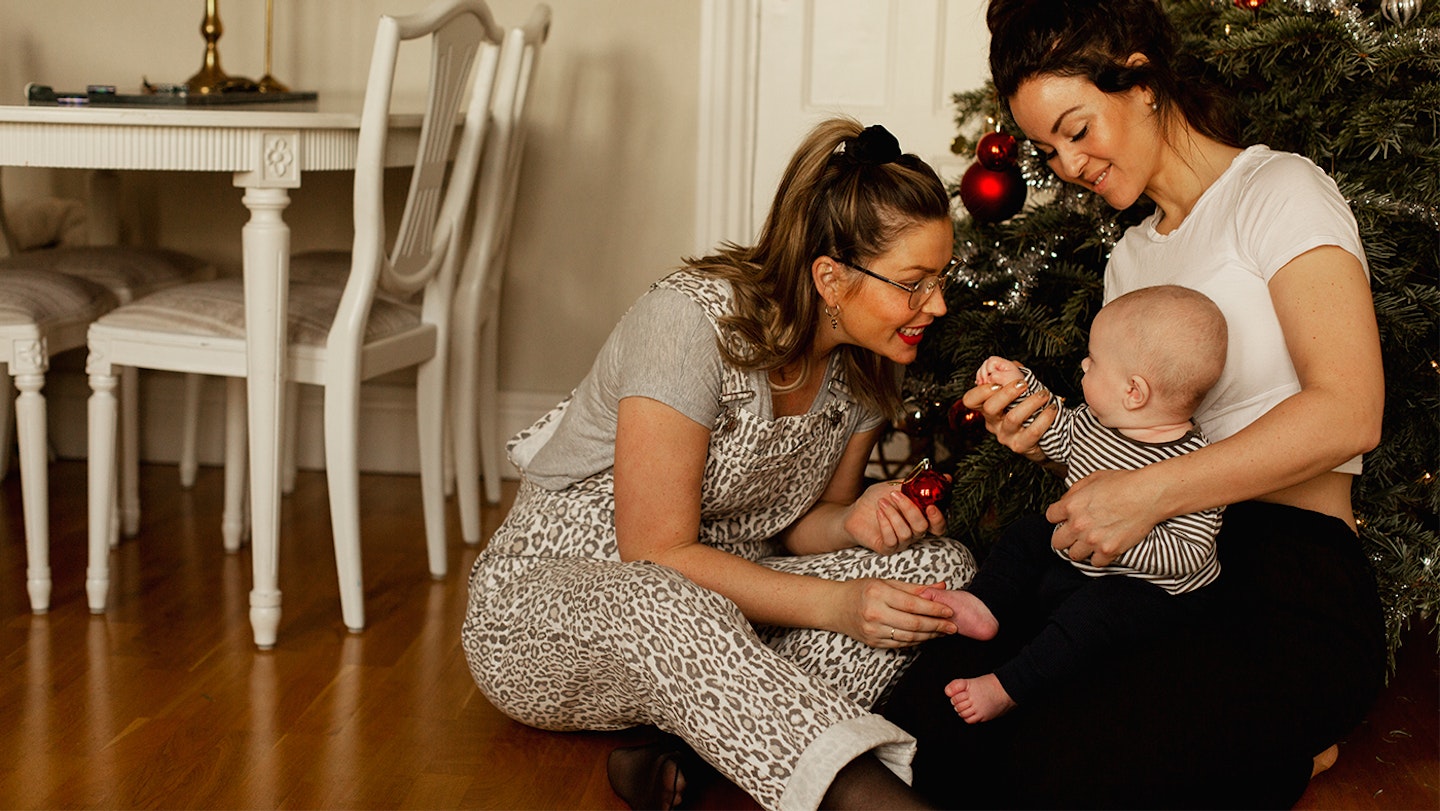Christmas can be a very emotional time, not least around the issue of where to spend your time and how to make sure different families feel included and appreciated and can share the festivities with you. This can be further complicated for separated parents, or if you have children and both sets of grandparents want to see them on Christmas Day. While it is lovely to spend Christmas with loved ones, you need to make time for you too!
Lucy Beresford, a psychotherapist, relationship expert and broadcaster, remembers: "I had a friend who complained one year that he was going to be spending the entire season driving from one end of the country to the other, pleasing everyone but himself." Lucy adds, "while Christmas is usually flagged up as the season of goodwill to all, in my view that includes you. You deserve a great Christmas, whatever your family situation, and there are lots of ways to make that happen."
It can become even harder with little ones because everyone wants to see them and experience the magic of Christmas through their excitement and wonder. It can often make you, the parents, feel like you are being pulled in a million different directions and there is pressure to keep everyone happy. Remember though, this is your family time too and it is important you make it special for you and your family, as well as wider friends and relatives.
Lucy thinks that Christmas can work for everyone if we all set some boundaries at the start outlining what we hope to do, building our own traditions and most importantly communicating with each other. Read her advice below to help you ensure Christmas is a special (and relaxing!) time for everyone, including you!
Communication is key
"Have conversations in advance, as this gives everyone time to adjust to new plans. If this is your first Christmas with a new baby, it is very important to be clear and firm about your preferences. This is because family members will be subtly vying with each other to secure your attendance at their Christmas, as if you and your child are some kind of prize. As a result, it is even more important that things happen exactly how you want them to happen."
Start your own traditions
"Even if in the past you have developed a routine of spending Christmas with one set of in-laws or the other, this year your new status as parents gives you the power to dictate who you see and for how long – your baby’s routine is the perfect excuse for not spending time away from home or declining other invitations. This is the perfect opportunity to start your own rituals with the family you have begun creating, whether that is around having a tree or not, when presents are opened, or taking a holiday overseas."
There are lots of things you can do over Christmas to start a tradition for your family. How about wearing matching Christmas pyjamas? It is a simple one, but fun, especially with little ones. Also, it lets you include anyone who might be invited to spend the day with you to wear them too.
Taking the perfect Christmas photo is another great idea. Again, it is not a costly, grand gesture, but it is a great opportunity to get people together and pose for a photo. Plus, as the years pass it will be lovely to keep each photo and look back on them as your little ones grow up.
For a more fun tradition, and one you might be happy for wider family to get involved in by sharing their ideas, you can startelf on the shelf. Kids love it, and it creates a great sense of excitement in the build up to Christmas. We won't lie, it can be a bit of a chore for parents, but get the family involved and ask them to message you ideas.

Be prepared to negotiate
Lucy advises: "The key to setting firm boundaries is also about anticipating any resistance - this is also known as emotional blackmail! So prepare yourself for emotionally-heavy phrases such as “it could be your father’s last Christmas with us” or “we haven’t seen you because of Covid” or “I’ll be so lonely without you”.
If you have a new baby, invite people over to yours for the day, but on the proviso that they bring all the food and don’t stay the night. For example, offer a tea for both sets of grandparents on different afternoons. And remember, making it clear in advance that you have different plans this year, gives your family the freedom and advance notice to make their own plans."
Set aside time for yourself
Lucy stresses the importance of time for yourself: "If you are having Christmas with your in-laws, I have one rule which is that you must carve out some time for yourself and hopefully your partner and children too. Ensure that every day you get out of the actual house without your in-laws. Going for a brisk walk, whatever the weather, or even browsing the sales, will have feel-good endorphins sloshing around your system. Plus, this time apart means you are in control of your experience which can be very helpful during a visit where everything else is done on other people’s terms."
If Christmas Day itself is going to be unavoidably busy with family, make sure you take some time out beforehand to spend time with little ones without the demands of wider family. Taking your toddler to meet Santa is a lovely day trip for some festive time out. Plus it will create lovely memories and may even become a Christmas tradition.

Don't be afraid to be firm
"And if Christmas is happening at yours this year, again set your boundaries. There is an old Chinese proverb that says that houseguests are like fish – they go off after 3 days. So never feel obliged to have people stay longer than you want them to. If you think 1 or 2 nights is your absolute limit, invite your in-laws for that amount of time."
Get everyone involved
"If you actively dislike your in-laws, allocate them easy yet specific (and hopefully time-consuming) chores under the guise of getting them in the festive mood to keep them out of your hair. Engineer things so that your exposure to them is diluted, such as inviting friends or neighbours round for drinks.
And remember the mantra of ‘my house, my rules’. I have a friend who treats her in-laws with the benevolent tolerance you show toddlers. This certainly makes the whole experience more bearable."
Another great, and festive, way to get everyone involved is to get some gifts for all the family. These will be fun to open together and might even include activities which can be played or enjoyed together. In the stress of cooking and decorating for Christmas, a little time out to share a gift might be just what you all need.

Finally Lucy adds: "The key is to remember that you (and your family unit) deserve a beautiful Christmas, so be clear in your mind about what you want. Keep the channels of communication open, and announce potentially awkward or disappointing news as soon as you can. And remember that it is the season of goodwill to mankind, but it’s also helpful to be a bit selfish too."
How to cope with difficult family dynamics?
Samantha Flanagan, a registered member of BACP, says it is okay to explain why something makes you feel uncomfortable. Christmas is tricky and often tempers and spirits are raised.
She says: "Maybe there's that cousin that always gets too drunk at the Christmas party and starts an argument with his father, or the brother that always comments on your choice of career? Each year you have to put up with this but you no longer have to.
You can state that these behaviours or comments are not okay. You can tell your brother that he may not agree with your career choice/partner/hair colour but that is your choice. Sending the message that the comments are hurtful and that your feelings and needs matter is crucial."
Of course, no wants to start a family argument over the roast turkey, but similarly you don't want to sit there feeling frustrated or annoyed. Samantha adds: "If conversations become heated over politics or differing opinions it's okay to state that it's time to change the subject to something a little less controversial and more enjoyable."
How do you set boundaries with family without feeling guilty?
Obviously Christmas is the season of goodwill and so no one wants to upset well meaning family members, but you are entitled to your space and an opportunity to relax and unwind, and not constantly entertain. The year is hectic enough, especially with young children, and everyone deserves a bit of peace at Christmas. But if standing firm leaves you feeling guilty that isn't nice either. Remember to set realistic expectations, for you and for family members. Also stop thinking of setting boundaries as selfish, rather think of it as healthy. If you just put up with intrusions it can lead to arguments therefore it is healthier to be honest from the start.
Christmas is supposed to be special but it also brings so much pressure and stress that sometimes you just want to get it over with, but it shouldn't be like that. If you do feel that way, be honest, explain to those you love that you need some time, and then when you do all get to together, it will be a calmer and happier environment. Just as when you limit visitors when you bring a new baby home from the hospital to reclaim your space and establish boundaries, you can do the same at Christmas if everyone is desperate to see you and your little (or not so little) ones. Of course, there will always be compromise too but if you set your boundaries from the start everyone should enjoy the festivities and get chance to relax.
Lucy Beresford is an experienced live broadcaster, an award-winning writer published across 4 continents, the host of a successful podcast 'On The Couch', founder of the award-winning Kindness Club, and an award-winning UKCP-registered psychotherapist. She has over 20 years clinical experience, and 20 years experience working in the media. Plus she is the author of 'Happy Relationships: at home, work and play,' and she has written about psychology in a variety of publications including: psychology out of the consulting room by writing for publications including Harpers Bazaar, Stella, Evening Standard, Metro, Daily Mail, Cosmopolitan, and The Daily Telegraph.
Samantha Flanagan (BA Hons, PGDIP) is a registered member of BACP with a level 7, Msc in Integrative Counselling and Psychotherapy. She is qualified to work with many issues which include but are not limited to: emotional abuse, trauma, anxiety, depression, substance mis-use, boundaries, self-esteem, work/life balance and life changes.
Laura Healy is a Commercial Content Writer for Mother&Baby. She is a mum-of-two girls and loves writing about all things parenting, she is particularly interested in the toddler years and eco-friendly baby products, as well as children’s literature. She has a PhD in Creative Writing and has published short stories in the UK and Ireland, as well as previously writing freelance for her local paper.
